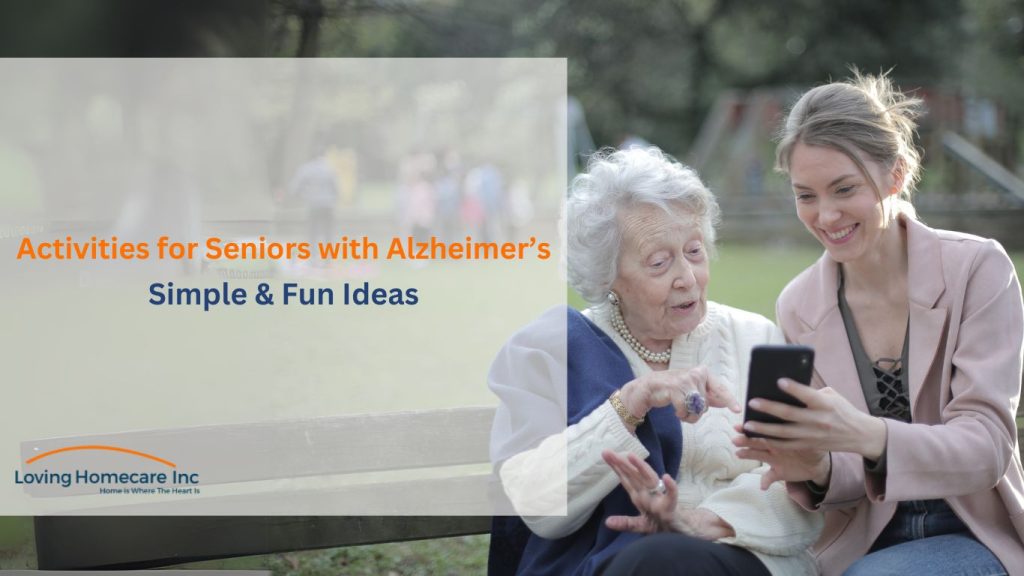Recently updated on April 4th, 2025 at 09:41 am
Quick Summary
- Keeping seniors with Alzheimer’s engaged in meaningful activities can improve their mood, reduce anxiety, and provide a sense of purpose.
- As the disease progresses, sensory activities and gentle interactions become even more critical.
- The key is to focus on what feels good rather than what they can accomplish.
Caring for a loved one with Alzheimer’s can be challenging, but meaningful activities can help to improve their quality of life. As the disease advances into further stages, seniors might struggle with memory and daily tasks. But this doesn’t mean that they can’t enjoy engaging in simple activities that can bring them comfort and joy.
Different activities for seniors with alzheimer’s can help keep them engaged. The right activities help more than just kill time- they can stimulate memory, reduce anxiety, and encourage social interactions. This article will discuss some simple yet effective activities for seniors to try.
Why are activities Important for Seniors with Alzheimer’s?
Engagement in various activities for Alzheimer’s patients is beneficial for a number of reasons. Different activities can help in different ways, such as:
- Stimulate memory—Familiar tasks can trigger past memories, which helps keep the brain active.
- Reduce agitation and anxiety – Simple, structured activities can provide a calming effect.
- Promote social interaction – Engaging in activities with caregivers or peers helps to develop an emotional connection.
- Enhance physical health – Gentle exercises improve mobility and coordination.
- Improve mood and self-esteem – A sense of accomplishment can boost confidence and reduce depression.
Activities for early-stage Alzheimer

1. Music and Singing
- Listening to familiar songs can evoke memories and emotions. Imagine an individual has some past memory related to a specific tune/music. This might help in recovery and is one of the easily accessible activities for alzheimer’s patients at home
- Singing along or playing simple percussion instruments adds a fun, interactive element.
2. Arts and Crafts
- Painting and coloring, or simple DIY crafts, can help to provide a creative expression.
- Activities like knitting or scrapbooking can help to enhance fine motor skills.
- Clay modeling or making greeting cards can be enjoyable.
3. Gardening
- Watering plants, planting flowers, or simply digging in the soil can be relaxing.
- Tending to a small herb garden offers sensory stimulation, which is an excellent activities for seniors with alzheimer’s and dementia.
4. Storytelling and Reading
- Reading short stories, poems, or religious texts can be engaging.
- Looking through photo albums and discussing past memories can stimulate conversation.
5. Simple Puzzles and Games
- Jigsaw puzzles with large pieces encourage problem-solving and involve the active participation of the mind, thus helping to keep the Alzheimer’s disease symptoms to a minimum.
- Word searches or matching games can keep the brain active.
- Playing card games like Go Fish or Uno provides social engagement, which ultimately helps people socialize and overcome the symptoms of the disease.
6. Cooking and Baking
- Simple recipes, such as decorating cookies or making sandwiches, can be fun for individuals.
- Smelling different spices and ingredients can evoke fond memories and is among the most effective fun activities for seniors with Alzheimer’s.
- Mixing, stirring, and rolling dough provide sensory engagement, which helps the overall involvement of the individual, thus helping in better therapy.
Activities for Middle-stage Alzheimers
In the middle stages, seniors may struggle with daily tasks, but they can still participate in structured activities for individuals with Alzheimer’s disease symptoms. The main focus of the activities should be on sensory experiences and emotional comfort.
1. Sensory Stimulation Activities
- Hand massages with scented lotions can be soothing and help provide relaxation to the individual.
- Playing with textured fabrics or therapy putty engages the sense of touch.
- Listening to nature sounds (birds chirping, ocean waves) can be calming and is among excellent fun activities for seniors with alzheimer’s
2. Animal Therapy
- Spending time with pets or therapy animals can reduce anxiety and help to relax the mind.
- Watching birds in a garden or through a window can be a simple pleasure.
- Soft, stuffed animals can provide comfort and companionship.
3. Folding Laundry and Sorting Tasks
- Folding towels or pairing socks provides a sense of accomplishment.
- Sorting objects by color, shape, or size can be engaging and help to keep the mind engaged, thus helping in overall well-being.
4. Chair Exercises and Movement
- Gentle stretching and seated yoga improve flexibility.
- Dancing to familiar tunes, even while seated, can boost mood and help restore memories.
5. Reminiscence Therapy
- Watching classic movies or television shows from their youth can trigger positive memories and is among the worthwhile activities for seniors with alzheimer’s and dementia.
- Listening to old radio programs or hearing stories about past events can be engaging.
- Creating a memory box with personal items can spark conversation.
Engaging Activities for Late-Stage Alzheimer’s

1. Soothing Music and Sounds
- Playing soft instrumental music can create a calming atmosphere.
- Nature sounds can help reduce agitation and anxiety.
- Humming or softly singing familiar tunes are comforting activities for alzheimer’s patients.
2. Tactile Activities
- Holding soft objects like stuffed animals or textured fabrics can provide comfort.
- Placing hands in a bowl of warm water or feeling different textures (cotton, silk, sandpaper) can be stimulating.
3. Gentle Massage and Aromatherapy
- Applying lavender or other essential oils can promote relaxation and help the mind and body to relax.
- Light hand, foot, or scalp massages can help in promoting overall well-being.
- Warm compresses on the hands or shoulders can be comforting.
4. Hand-held objects and Fidget Toys
- Soft stress balls, textured blankets, or fidget blankets with buttons and zippers can keep hands busy.
- Beaded bracelets or worry stones can provide a calming effect.
5. Watching Family Videos and Looking at Photos
- Even if they can’t recognize faces, familiar voices and laughter can be soothing.
- Flipping through picture books or old magazines with colorful images can provide visual interest.
- Holding photo albums and listening to caregivers describe the images can create a connection.
6. Simple Taste and Smell Activities
- Offering familiar scents like coffee, cinnamon, or vanilla can evoke memories and is among the interactive activities for seniors with dementia or alzheimer’s.
- Tasting small amounts of favorite flavors (honey, applesauce, mint) can be comforting.
- Sipping warm tea or flavored water can provide a calming sensory experience.
Conclusion
Engaging a loved one with Alzheimer’s in meaningful activities helps to create a big difference in their well-being. Whether it is listening to music, baking cookies, or simply holding a familiar object, these small moments are among the comforting and joyful activities for seniors with alzheimer’s.
In the treatment of Alzheimer’s patients, the goal is to create a positive experience and try different activities to see what suits the patient the best. Even the simplest moments can bring happiness and a sense of connection to the suffering individual.
At Loving Homecare Inc., we understand the challenges of caring for a loved one with Alzheimer’s. Our compassionate caregivers provide personalized in-home support, helping seniors stay engaged, safe, and comfortable in familiar surroundings.
If you need assistance with daily care, meaningful activities, or specialized dementia support, we’re here to help. Contact Loving Homecare Inc today to learn how our services can make a difference for your loved one.
Call us now or visit our website to schedule a free consultation!

